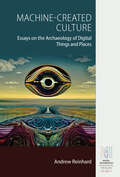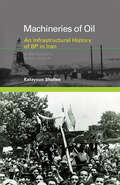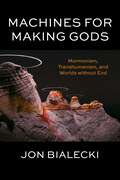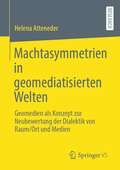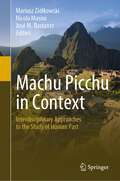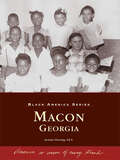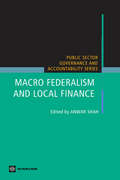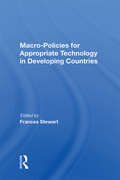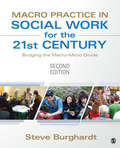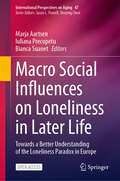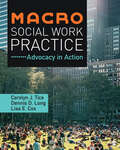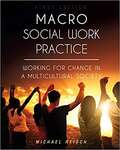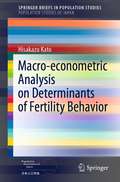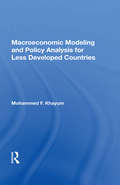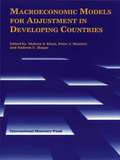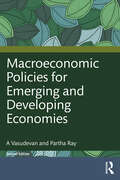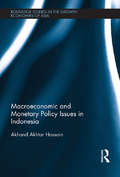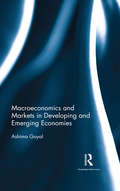- Table View
- List View
Machine-Created Culture: Essays on the Archaeology of Digital Things and Places (Digital Archaeology: Documenting the Anthropocene #3)
by Andrew ReinhardArchaeology can be weird and fun, especially the digital kind. Readers of archaeology, media studies, and game studies are introduced to the wild-and-wooly side of digital archaeology: artifacts, sites, and landscapes contained within—and supporting—interactive digital built environments. Follow your guide, the reluctant digital archaeologist Charlie, to disappear into the weeds of post-landscapes, non-place cultural spaces, persistent digital spaces, software citizenship, machine-created culture, digital drift, technofossils, quantum archaeology, archaeological time, singularities, complexity and retrocausality, noise, and more. These bite-sized chapters offer new ways of interpreting humanity’s blossoming digitalia, an archaeology done at the source of creation, use, and abandonment of our electronic selves.
Machineries of Oil: An Infrastructural History of BP in Iran (Infrastructures)
by Katayoun ShafieeThe emergence of the international oil corporation as a political actor in the twentieth century, seen in BP's infrastructure and information arrangements in Iran. In the early twentieth century, international oil corporations emerged as a new kind of political actor. The development of the world oil industry, argues Katayoun Shafiee, was one of the era's largest political projects of techno-economic development. In this book, Shafiee maps the machinery of oil operations in the Anglo-Iranian oil industry between 1901 and 1954, tracking the organizational work involved in moving oil through a variety of technical, legal, scientific, and administrative networks. She shows that, in a series of disagreements, the British-controlled Anglo-Iranian Oil Company (AIOC, which later became BP) relied on various forms of information management to transform political disputes into techno-economic calculation, guaranteeing the company complete control over profits, labor, and production regimes. She argues that the building of alliances and connections that constituted Anglo-Iranian oil's infrastructure reconfigured local politics of oil regions and examines how these arrangements in turn shaped the emergence of both nation-state and transnational oil corporation. Drawing on her extensive archival and field research in Iran, Shafiee investigates the surprising ways in which nature, technology, and politics came together in battles over mineral rights; standardizing petroleum expertise; formulas for calculating profits, production rates, and labor; the “Persianization” of employees; nationalism and oil nationalization; and the long-distance machinery of an international corporation. Her account shows that the politics of oil cannot be understood in isolation from its technical dimensions.
Machines for Making Gods: Mormonism, Transhumanism, and Worlds without End
by Jon BialeckiThe Mormon faith may seem so different from aspirations to transcend the human through technological means that it is hard to imagine how these two concerns could even exist alongside one another, let alone serve together as the joint impetus for a social movement. Machines for Making Gods investigates the tensions between science and religion through which an imaginative group of young Mormons and ex-Mormons have found new ways of understanding the world.The Mormon Transhumanist Association (MTA) believes that God intended humanity to achieve Mormonism’s promise of theosis through imminent technological advances. Drawing on a nineteenth-century Mormon tradition of religious speculation to reimagine Mormon eschatological hopes as near-future technological possibilities, they envision such current and possible advances as cryonic preservation, computer simulation, and quantum archeology as paving the way for the resurrection of the dead, the creation of worlds without end, and promise of undergoing theosis—of becoming a god. Addressing the role of speculation in the anthropology of religion, Machines for Making Gods undoes debates about secular transhumanism’s relation to religion by highlighting the differences an explicitly religious transhumanism makes.Charting the conflicts and resonances between secular transhumanism and Mormonism, Bialecki shows how religious speculation has opened up imaginative horizons to give birth to new forms of Mormonism, including a particular progressive branch of the faith and even such formations as queer polygamy. The book also reveals how the MTA’s speculative account of God and technology together has helped to forestall some of the social pressure that comes with apostasy in much of the Mormon Intermountain West.A fascinating ethnography of a group with much to say about crucial junctures of modern culture, Machines for Making Gods illustrates how the scientific imagination can be better understood when viewed through anthropological accounts of myth.
Macho Love: Sex Behind Bars in Central America
by Jacobo SchifterMacho Love: Sex Behind Bars in Central America is the first in-depth study of sexual culture and AIDS in Latin prisons. Psychologists, social workers, criminologists, and AIDS specialists will discover how the interplay of sexual ideals, prostitution, manipulation, resistance, and power relationships among prisoners and some staff are based on money, sex, drugs, and violence. Macho Love gives you a stirring and emotional look at the various risks and dangers lurking in the Latin American prison culture and discusses how Costa Rican and Central American prisons are improving the situation with new intervention programs. Fascinating and informative, Macho Love explores the dangerous Latin prison culture as it discusses: new HIV/AIDS prevention programs implemented in some Costa Rican and Central American prisons the frequency and types of prostitution and rape in prison drug and alcohol addiction and their effects on the spread of HIV/AIDS an understanding of why rehabilitation programs fail or succeed the lack of opportunities to work or to study that leaves the inmates vulnerable to the only freedom they have left--sex why a “cachero,” or a man who penetrates another man, is not considered a homosexual and often refuses to wear a condom, which tremendously increases the risk of HIV/AIDS Macho Love explores the life-threatening sexual culture in prisons to bring you the realities of the Latin prison culture. This revealing book examines the different types of relationships which occur in prisons and the factors that place inmates at risk for contracting the HIV virus, such as not wearing a condom because of intoxication due to drugs and alcohol. Macho Love also shows you how the new HIV/AIDS intervention programs in Costa Rica are combatting these serious problems to lower HIV infection rates and avoid the spread of this deadly and dangerous disease.
Macho Men in South African Gyms: The Idealization of Spornosexuality (Palgrave Studies in Masculinity, Sport and Exercise)
by Jacques RothmannThis book explores the experiences of self-identified heterosexual and gay men in contemporary South African gym contexts, particularly as it relates to how the intersection of spornosexual and inclusive masculinities inform their views and enactment of their masculine and sexual identities. Chapters engage with findings from an in-depth qualitative sociological exploration on issues surrounding these masculinities among men living in South Africa who engage in gym work. The author demonstrates that men, when given the opportunity to reflect on their own and the masculinity of others, acknowledge how they promote softer, kinder, disciplined, playful, and sexually agentic masculinities through their look and touch.
Macht und Herrschaft: Zur Revision zweier soziologischer Grundbegriffe
by Peter Gostmann Peter-Ulrich Merz-BenzDas Buch befasst sich mit Kernbegriffen der Sozialwissenschaften: Macht und Herrschaft. Mit Beiträgen von Gerhard Wagner, Guy Oakes, Hubert Treiber, Peter Gostmann, Peter-Ulrich Merz-Benz, Dirk Tänzler und Stephen Turner.
Machtasymmetrien in geomediatisierten Welten: Geomedien als Konzept zur Neubewertung der Dialektik von Raum/Ort und Medien
by Helena AttenederAnsätze einer kritischen Neubewertung gesellschaftlicher (Kommunikations-)Phänomene in Raum und Zeit werden jüngst in der semi-autonomen Brückendisziplin „Geomedia“ bzw. „Geomedia Studies“ vereint, die sich an der Schnittstelle zwischen Medien-, Kommunikationswissenschaft und Geographie etabliert hat. Daran anknüpfend wird Geomediatisierung als die zunehmende Durchdringung der Gesellschaft mit Geomedientechnologien und deren wahrgenommener Unerlässlichkeit in einer Vielzahl von Alltagszusammenhängen als dialektischer Prozess verstanden, dessen detaillierte Ausformung dem Kräfteverhältnis und den Aushandlungsprozessen mehr oder weniger einflussreicher (sozialer) Interessensgruppen obliegt. Machtverhältnisse manifestieren sich dabei sowohl in den Potentialen bzw. Schranken für individuelle Nutzer*innen, in den Strukturen der Gesellschafts- und (kapitalistischen) Wirtschaftsordnung und letztlich in Prozessen der sozialen und räumlichen (Re-)Produktion.In diesem Buch werden auf jeweils unterschiedlichen Abstraktions- und Analysestufen Geomedientechnologien als sozio-technologische Phänomene kritisch erschlossen und im Hinblick auf Manifestationen von Macht überprüft.
Machu Picchu in Context: Interdisciplinary Approaches to the Study of Human Past
by Nicola Masini Mariusz Ziółkowski José M. BastanteThis book aims at integrating archaeology with science in order to provide additional information with respect to a traditional archaeological anthropological perspective. It sheds light on Incan culture, the relation between human frequentation and environmental changes, the Incan architecture in relation with Andean cosmovision using, for the first time, diverse technological and scientific approaches including LiDAR remote sensing, geophysics and radio carbon dating. A number of recent studies conducted by Polish, Italian and Peruvian scientific missions in Machu Picchu, Chachabamba and Cusco are presented and discussed.Chapter 5 is available open access under a Creative Commons Attribution-ShareAlike 4.0 International License via link.springer.com.
Macon, Georgia (Black America Series)
by Jeanne Herring Ed.S.In this engaging new visual history showcasing Macon's African Americans, vintage photographs illuminate the contributions and achievements of black citizens who have lived and worked in the heart of Georgia for more than one hundred and fifty years. Local landmarks, such as the Douglass Theater and the Harriet Tubman Museum, and unique African-American communities, such as Summerfield and Pleasant Hill, are testament to the indelible mark left on Macon by its enterprising black residents.
Macro Federalism and Local Finance
by Anwar M. ShahThe design of a federal system to deal with growth, stabilization, and regional and local development issues is the primary concern of this volume, edited by Anwar Shah. The book provides analytical tools to address issues arising from globalization, localization, and regional integration. It discusses tax harmonization issues associated with subnational value added tax administration. It provides a framework for fiscal discipline in a federal system. Lessons from international experiences from policies to deal with lagging regions are drawn. The book empirically examines the effect of fiscal decentralization on the overall size of the public sector. Finally, it draws lessons from industrial countries' experiences on local governance. This important new series represents a response to several independent evaluations in recent years that have argued that development practitioners and policy makers dealing with public sector reforms in developing countries and, indeed, anyone with a concern for effective public governance could benefit from a synthesis of newer perspectives on public sector reforms. This series distills current wisdom and presents tools of analysis for improving the efficiency, equity, and efficacy of the public sector. Leading public policy experts and practitioners have contributed to the series.
Macro Policies For Appropriate Technology In Developing Countries
by Frances StewartThis book explores the effects of macro-policies and determines which policies have best promoted appropriate technology in developing countries. It explores the political economy of macro-policies, examining which groups in society are likely to benefit from alternative policies and technologies.
Macro Practice in Social Work for the 21st Century: Bridging the Macro-Micro Divide
by Steve BurghardtMacro Practice in Social Work for the 21st Century, Second Edition offers a modern approach to building effective career skills in macro practice. Author Steve Burghardt inspires students by tracing the careers of macro-practitioners from grass roots organizers to agency executives. By focusing on how practitioners can make meaningful, strategic choices regardless of their formal roles and responsibilities, this Second Edition takes a refreshing new approach on the key issues of how to respond to diversity and oppression, the use of the internet for organization, the limits of “virtual trust,” understanding where "micro" and "macro" meet in practice, and co-leadership development.
Macro Practice in Social Work for the 21st Century: Bridging the Macro-Micro Divide
by Steve BurghardtMacro Practice in Social Work for the 21st Century, Second Edition offers a modern approach to building effective career skills in macro practice. Author Steve Burghardt inspires students by tracing the careers of macro-practitioners from grass roots organizers to agency executives. By focusing on how practitioners can make meaningful, strategic choices regardless of their formal roles and responsibilities, this Second Edition takes a refreshing new approach on the key issues of how to respond to diversity and oppression, the use of the internet for organization, the limits of “virtual trust,” understanding where "micro" and "macro" meet in practice, and co-leadership development.
Macro Practice: A Generalist Approach (6th edition)
by Ralph Brody Murali D. NairThis volume studies the environmental context affecting human services and social agencies, the service delivery system and review of generic flowchart model case management.
Macro Social Influences on Loneliness in Later Life: Towards a Better Understanding of the Loneliness Paradox in Europe (International Perspectives on Aging #47)
by Marja Aartsen Iuliana Precupetu Bianca SuanetThis open access book explores the macro-social influences on loneliness in later life, emphasizing how societal structures, cultural contexts, and broader social transformations shape the experience of loneliness. Dedicated to the social construction of loneliness and the notable heterogeneity in its prevalence across European countries, this volume brings together a distinguished selection of experts who share their latest insights on meso- and macro-level influences, cultural and structural theories, and the impact of digitalization, climate change, and societal crises. Divided into five parts, the book addresses key aspects of this complex issue. The first part introduces the central themes, outlining the relevance of loneliness as a societal concern and discussing the limitations of existing research, which predominantly focuses on individual-level factors. It highlights the need for a multi-level approach that incorporates micro, meso, and macro perspectives to fully understand the contextual influences on loneliness. The second part delves into theoretical perspectives, offering a comprehensive framework for understanding loneliness at different levels. It examines the interplay between individual, relational, and societal factors while also exploring cultural and social exclusion perspectives that shed light on how loneliness manifests across different contexts. The third part presents empirical evidence, focusing on variations in loneliness across different social groups and regions in Europe. It synthesizes research on micro- and meso-level determinants while also providing a review of macro-level influences. This part highlights the role of welfare regimes, demographic trends, and broader societal conditions in shaping the prevalence and experience of loneliness. The fourth part explores recent societal developments that may influence loneliness, including digitalization, migration, climate change, and societal crises. These emerging topics illustrate how macro-level transformations can either alleviate or exacerbate loneliness, depending on how they interact with existing social structures and individual circumstances. The final part discusses methodological advancements and policy implications. It introduces an innovative approach to analyzing macro-social influences on loneliness and revisits the &‘loneliness paradox&’ in light of new findings. The book concludes with policy recommendations and future research directions, emphasizing the need for a holistic approach that integrates individual, relational, and societal dimensions to develop more effective interventions against loneliness. In sum, by adopting a macro-social lens, this book contributes to a deeper understanding of the societal, cultural, and policy-related determinants of loneliness. It offers a foundation for evidence-based interventions that go beyond individual-level solutions, recognizing loneliness as a socially embedded phenomenon shaped by broader societal forces. It is our hope and expectation that the book and its content will fundamentally change our understanding of loneliness and strategies to combat it.
Macro Social Work Practice: Advocacy in Action
by Carolyn J. Tice Dennis D. Long Lisa E. CoxEmpower your students to become advocates for change. Macro Social Work Practice: Advocacy in Action shows readers studying in macro social work practice how to enact change at the organizational, community, societal, and global levels. An emphasis is placed on engaging in macro practice using the tenets of the award-winning author team’s Advocacy Policy and Practice Model (APPM) that highlight the inclusion of economic and social justice, supportive environment, human needs and rights, and political access. Beginning with a history of macro practice and continuing with contemporary issues facing social workers, this new text helps readers learn how to enact advocacy, informed by key orientations and perspectives and grounded in timely and relevant examples and causes.
Macro Social Work Practice: Advocacy in Action
by Carolyn J. Tice Dennis D. Long Lisa E. CoxEmpower your students to become advocates for change. Macro Social Work Practice: Advocacy in Action shows readers studying in macro social work practice how to enact change at the organizational, community, societal, and global levels. An emphasis is placed on engaging in macro practice using the tenets of the award-winning author team’s Advocacy Policy and Practice Model (APPM) that highlight the inclusion of economic and social justice, supportive environment, human needs and rights, and political access. Beginning with a history of macro practice and continuing with contemporary issues facing social workers, this new text helps readers learn how to enact advocacy, informed by key orientations and perspectives and grounded in timely and relevant examples and causes.
Macro Social Work Practice: Working for Change in a Multicultural Society
by Michael ReischMacro Social Work Practice: Working for Change in a Multicultural Society explores the dynamics and practice implications of increasingly diverse communities, organizations, and social service networks and helps students develop the skills to work successfully in these contexts. <p><p> The book gives students the foundational skills and knowledge required for effective practice in social service and human organizations, healthcare settings, communities, social networks, and social movements. It emphasizes the relationship between structural and institutional inequalities and the experiences of individuals, families, communities, and organizations. <p><p> Through case examples the book illustrates how principles of social justice, empowerment, and cultural awareness can be applied in different cultural contexts. Through various exercises, students will apply critical thinking to resolve practical and ethical dilemmas and make the type of difficult decisions that practitioners confront every day. The book also addresses how recent political events, cultural developments, and social changes have altered both the context and the content of macro social work practice in the United States. <p><p> Macro Social Work Practice is appropriate for undergraduate and graduate courses in social work, family and community development, public health, nursing, and human services. <p><p> Michael Reisch is the Daniel Thursz Distinguished Professor of Social Justice at the University of Maryland, Baltimore. He earned his master's degree in social work at Hunter College, and his Ph.D. in modern European history and the history of ideas at the State University of New York, Binghamton. He has held leadership positions in multicultural national, state, and local advocacy, professional, political, and social change organizations His publications have appeared in journals such as Social Work, Social Service Review, the British Journal of Social Work, and the Journal of Social Work Education. His most recent books are Social Policy and Social Justice: Meeting the Challenge of a Diverse Society and Social Work and Social Justice: Concepts, Challenges, and Strategies (co-authored with Charles Garvin). In 2014, he received the Significant Lifetime Achievement Award from the Council on Social Work Education and, in 2016, he was elected a Fellow of the American Academy of Social Work and Social Welfare.
Macro-econometric Analysis on Determinants of Fertility Behavior (SpringerBriefs in Population Studies)
by Hisakazu KatoThe book comprises three chapters, with each chapter assigned various type data such as time series data, cross sectional data and panel data. The purpose of this book is to explore the economic and social determinant factors of fertility. Unlike many previous empirical analyses of fertility and the related demographic events, this research has three characteristics. The first is that the relationship between fertility and labor participation by females is thoroughly considered, with much discussion about the structural change between those factors. The second is that time series analysis such as the Bayesian vector autoregressive (BVAR) model or co-integration concepts is applied to explore the determinant factors of fertility. The third is that the effectiveness of public policies related to improve fertility is confirmed. In recent years, micro-econometric analysis has become popular; however, this book takes another approach from the perspective of macro- or semi-macro-econometrics.
Macroeconomic Modeling And Policy Analysis For Less Developed Countries
by Mohammed F KhayumThis book provides an overview of macroeconometric modeling for less developed countries, a description of the structure and performance of Guyana's economy, an empirical testing of the model using annual data for Guyana, and a simulation approach to policy evaluation.
Macroeconomic Models for Adjustment in Developing Countries
by Mohsin S. Khan Peter J. Montiel Nadeem U. HaqueA report from the International Monetary Fund.
Macroeconomic Policies for Emerging and Developing Economies
by Partha Ray A VasudevanThis book examines the relevance of the concepts and hypotheses of macroeconomics in the contemporary world. It discusses the current debates on theory and practices of macroeconomic policies with a focus on developing economies emerging from the impact of Covid-19 pandemic. The volume advocates for a symbiotic relationship between macroeconomic policies and development strategies. It analyses several issues related to macroeconomic tools, which include openness, capital flows, exchange rate and financial strategies. It underscores the need to design a development strategy that accounts for the economic context of the countries concerned. Further, the book advocates for well-regulated macrofinancial policies promoting sustainable growth. It also provides recommendations to policy makers on formulating a sound and inclusive macroeconomic policy essential for financial stability. This book will be of interest to students and researchers of macroeconomics, public administration, development studies, management and policymaking. It will also be useful to economists, policymakers and journalists working on emerging and developing economies.
Macroeconomic Policy and Poverty Reduction
by Brian Ames Ward Brown Shanta Devarajan Alejandro IzquierdoA report from the International Monetary Fund.
Macroeconomic and Monetary Policy Issues in Indonesia (Routledge Studies in the Growth Economies of Asia)
by Akhand Akhtar HossainFollowing the acquisition of its sovereignty from the Netherlands in 1949, Indonesia experienced serious economic and political problems during the 1950s and 1960s, before entering a three-decade-long period of rapid economic growth. Hard-hit by the financial crisis of the late 1990s, Indonesia undertook a wide range of economic and financial reforms. These reforms served to prepare it well for the 2007-08 global financial crisis, through which Indonesia passed relatively unscathed. Drawing on empirical research, this book presents a comprehensive empirical study on the key macroeconomic relations and monetary policy issues in Indonesia. The book analyses monetary, fiscal and exchange-rate policies, looking at their interactions and impacts on the economy. It demonstrates how important macroeconomic management for monetary and financial stability is to sustained national economic growth and development. Data from the 1970s is compared and contrasted with 1950s data to analyse macroeconomic policies and issues in an historical context. Statistical and econometric techniques are juxtaposed with general empirical results to supplement informative discussion of macroeconomic and monetary developments. This book is a useful contribution to studies on macroeconomics and international development, as well as Southeast Asian studies.
Macroeconomics and Markets in Developing and Emerging Economies
by Ashima GoyalThe book presents and further develops basic principles and concepts in international finance and open economy macroeconomics to make them more relevant for emerging and developing economies (EDEs). The volume emphasises the necessity of greater knowledge of context as populous Asian economies integrate with world markets, as well as the rapidly changing nature of the area due to rethinking after the global financial crisis. It addresses a host of themes, including key issues such as exchange rate economics, macroeconomic policy in an open economy, analytical frameworks for and experience of EDEs after liberalisation, the international financial system, currency and financial crises, continuing risks and regulatory response. This book will be useful to scholars and researchers of economics, especially in macroeconomics, business and finance and development studies.
